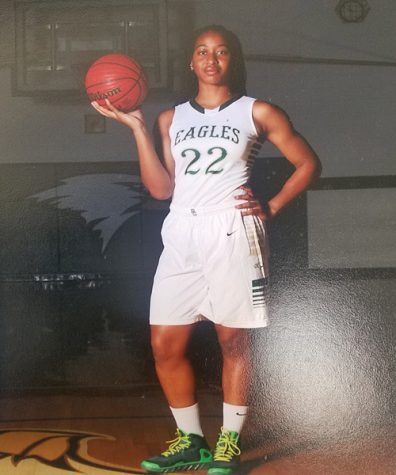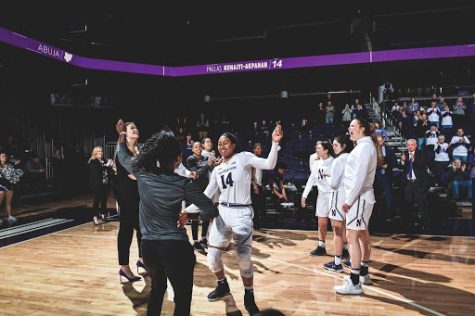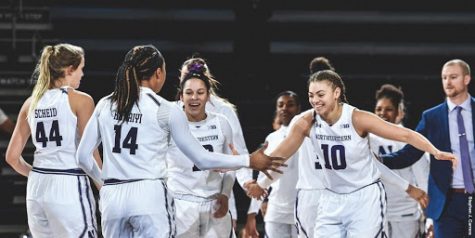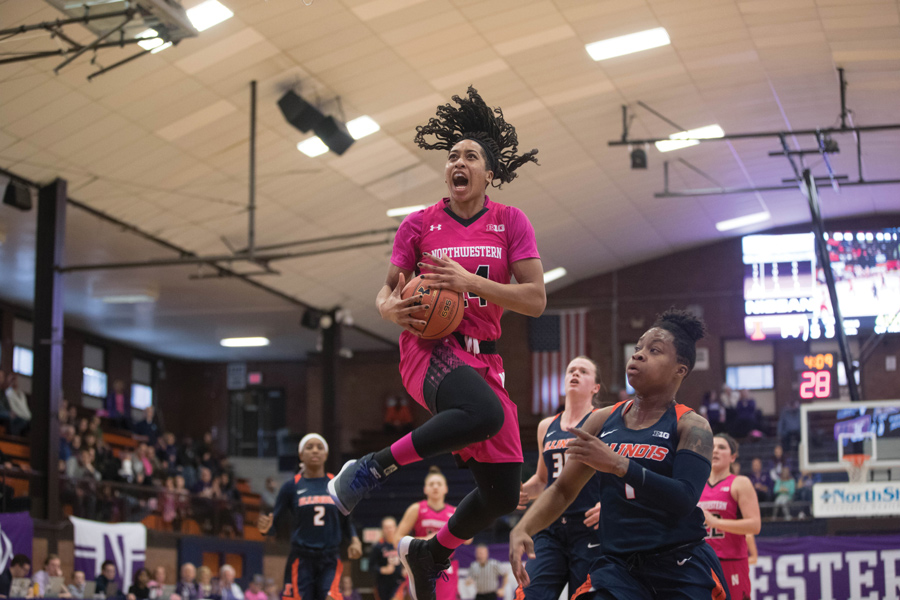Women’s Basketball: From Nigeria to Northwestern, Pallas Kunaiyi-Akpanah etches her name into the history books
March 5, 2019
Women’s Basketball
After a team practice in the summer of 2018, Pallas Kunaiyi-Akpanah was ready to do the improbable.
Sporting purple Northwestern shorts and a purple shirt with No. 14 on the back, the 6-foot-2 center gathered herself behind the 3-point line before exploding to the basket.
Two dribbles. Smooth ball transition from left to right hand. Liftoff from the painted area.
With her teammates and coaches watching and a painted purple Chicago skyline as her backdrop, Kunaiyi-Akpanah elevated above the cylinder with her outstretched right arm and threw down a rim-rattling jam with authority.
Boomshakalaka.
“I had never done it before and I went up and I was able to do it,” Kunaiyi-Akpanah said. “(I) like (doing) something that excites everyone like that. Everyone was like really happy for me.”
Whelp that’s H.O.R.S.E for me… Dang I’m telling y’all women evolving
@SportsCenter @pallas_ka pic.twitter.com/c4M4yWYmTU
— j h a m . (@jrhamilton14) July 30, 2018
What about in game action?
“I tried once in a game this year and… epic fail,” she admitted. “So I don’t think I’ll be doing that again. Until I can do it again in practice, then I don’t think I’ll do it again in a game.”
While no statistics exist for the number of women who have thrown down epic practice slams, dunking in women’s basketball remains an exceedingly rare accomplishment. In the WNBA, only seven women have ever dunked in a game in the league’s 20-plus year history.
That makes Kunaiyi-Akpanah’s dunk all the more impressive, even if it took place in Blomquist Recreation Center and the clip of the one-hander only went semi-viral on Twitter with 16,000 views.
In her final season at Northwestern, Kunaiyi-Akpanah has played magnificently, averaging a double-double with 11 points and 11 rebounds and earning a First Team All-Big Ten selection by the conference media. The senior from Abuja, Nigeria, is an impressive center, recently becoming just the second player in Northwestern history to notch 1,000 rebounds over the course of a career.
She has become a locker room leader by example, inspiring with her work ethic and high motor, diving on the floor for loose balls as she does the team’s dirty work.
But she’s come a long way from where her basketball career began in Nigeria — over 6,000 miles to be exact — to make it to Welsh-Ryan Arena and bitterly cold Evanston winters.
Hope for a girl
Even when she was younger, Kunaiyi-Akpanah was tall. So tall, she said, that people would regularly encourage her to play basketball. Eventually, she acquiesced and her parents signed her up for a basketball training program.
“I remember playing a bit of basketball at my boarding school in Nigeria and I was terrible at the time,” Kunaiyi-Akpanah said. “But people would still pass me the ball because I’m like the tallest person there, and they’re like, ‘Here you go!’ and I’m like, ‘I don’t know what to do with this!’”
She didn’t take her basketball training program all that seriously at first, not attending as consistently as some of the other kids and usually just showing up when she was bored. But not long after she started going to the training academy in Abuja, she found out Mobolaji Akiode, the founder and executive director of the organization Hope 4 Girls Africa, was coming for a day.
Kunaiyi-Akpanah made sure she attended that visit.
Familiar with Akiode’s work with Hope 4 Girls Africa, which was founded on the premise that sports and education can be used to empower girls in Nigeria and around the continent, a coach introduced Akiode to Kunaiyi-Akpanah. The coach told Akiode about Kunaiyi-Akpanah’s raw talent. But he was more interested in how Akiode could improve the young player’s self-confidence.
“The thing that blew me away about her was just how smart she was,” Akiode said. “She was super shy, you know, it took a while to get her to open up, but once she did… I was like, this is a girl who will be successful no matter what she does in life.”
Akiode then met with Kunaiyi-Akpanah’s parents, who learned about the work Akiode did and entrusted their daughter to her mentorship. About a year later, when Kunaiyi-Akpanah was about 15, Akiode set up the next step: an opportunity to move to the United States to attend the Rabun Gap-Nacoochee School, a private boarding school in Georgia.
When it came time to leave home and travel across the ocean to her new school, Kunaiyi-Akpanah felt prepared, as she’d attended boarding school in Nigeria for roughly five years at that point. She knew how the sad separation from her parents felt, how she would cry when looking at her mom as she was getting dropped off.
However, there was one key difference. While in Abuja, her parents would come on visiting days and picnic with her on the school’s campus. Once Kunaiyi-Akpanah moved to Georgia, she saw her parents about once in three years.
“That was definitely different and was definitely tough,” she said. “But, you know, people at Rabun Gap treated me just like family, and it wasn’t too bad after that.”
Building the foundation
When Kunaiyi-Akpanah arrived at Rabun Gap in the fall of her sophomore year, coach Dale Earnhardt was immediately impressed with her athleticism. But he saw the work that needed to be done with her ball-handling, layups and footwork.
“I joke with a lot of people that I went home and just started crying to my wife after I saw our (first) workout,” Earnhardt said. “I’m like oh my gosh, she is so raw, she has no clue what she’s doing.”
Early on, Earnhardt said Kunaiyi-Akpanah struggled to adapt to small intricacies of the game like the three-second rule. After she grabbed an offensive rebound, Earnhardt said she would often immediately kick the ball out to a guard on the perimeter instead of putting it back up because she was afraid of getting called for a three-second violation.
But she worked on improving her aggressiveness inside and as Kunaiyi-Akpanah gained experience with a more structured form of basketball, she began to figure out her role on the court and averaged a double-double.
“We spent a lot of time working on post moves to try to get her to look more like a college player as a junior and senior,” Earnhardt said. “I think when she was recruited…most schools’ coaches saw her potential as an athlete, a rebounder. Even during her time here, I would say she spread the floor, rebound, put back, block shots, defend and she was good around the paint.”

Pallas Kunaiyi-Akpanah during her senior year at Rabun Gap.
Kunaiyi-Akpanah didn’t go home for her summer breaks during high school, opting instead to stay with her aunt in Florida and play AAU basketball. Akiode connected her with the club coach at Florida Girls Basketball, Kenneth Kallina, and advised the high schooler to play travel ball to gain greater exposure in the basketball world.
Kunaiyi-Akpanah said Kallina took one look at her and told her she was on the team. It didn’t take much longer for the coach to realize what kind of person she was.
During one of the two seasons they spent together, while driving through Atlanta on the way to a tournament, Kunaiyi-Akpanah asked Kallina if he could pull over the van so she could “practice philanthropy” by giving money to a homeless person on the side of the road. He was floored by her altruism.
Earnhardt echoed that character assessment, remembering multiple times throughout Kunaiyi-Akpanah’s high school career where she stopped playing in a game to check on an injured player.
“People have helped me so much in my life and nothing I have like, accomplished ‘till this day, I would never have done without the help of others,” Kunaiyi-Akpanah said.
Committing to NU
Before playing travel basketball, Kunaiyi-Akpanah saw the sport just as something she did for fun. After she spent multiple years competing against Division I-level players, it became more serious, with the game operating as an avenue for her to get to college.
At one point in her junior year, Kallina estimated that about 50 or 60 schools were interested in recruiting Kunaiyi-Akpanah, but NU already had a sizable lead on the pack. Kunaiyi-Akpanah said its combination of top-tier academics and an up-and-coming athletic department made NU the best fit.
Not to mention that her dad had the chance to hit the links with coach Joe McKeown on an official campus visit. Her decision was announced at Rabun Gap’s signing day in November 2014.
#tbt to signing day with @ksenijamadz pic.twitter.com/FcYsHN3bGJ
— The Royal Pallas (@leroyalpallas) December 18, 2014
Kallina said she couldn’t wait to see what was ahead for her former player.
“She could defend anybody in the post, she was the best rebounder on the floor all the time,” Kallina said. “And, you know, she got better and better with us, but I knew her best basketball would be in college.”
Under Nia’s wing
When Kunaiyi-Akpanah arrived on campus as a freshman, junior forward Nia Coffey was already a rising superstar. Coffey, the fifth overall pick in the 2017 WNBA Draft, said Kunaiyi-Akpanah challenged her in practice with her tenacious effort. The effort from the sparingly-used freshman forward rubbed off onto the team’s best player.
While on the team with Coffey, Kunaiyi-Akpanah played a limited role in the NU offense, averaging under four points per game. But she grew as she trained alongside the team’s star. Earlier this season, she credited Coffey’s influence after she recorded her 1,000th career rebound and became the second player to do so in program history. Coffey still holds the all-time NU mark with 1,183 rebounds in her career.

Pallas Kunaiyi-Akpanah shows off her moves at Welsh-Ryan Arena.
“I (had) a chance to come here and play alongside (Coffey) for two years and just watch how she plays with such poise and skill and talent,” Kunaiyi-Akpanah said. “She’s very hard working, so to be able to follow her footsteps and also being able to sit alongside her in the history books is really huge for me.”
Coffey said that Kunaiyi-Akpanah helped her with her off-the-court knowledge as well. When the team got together to hang out, Coffey said Kunaiyi-Akpanah would always find a way to dance, and as a result, made a similar impact on Coffey’s dancing game as she did in her rebounding game.
“My best dance move?,” Kunaiyi-Akpanah pondered. “I do a lot of popular dances, like a lot of the mainstream stuff. So I don’t know what was popping back then. But right now I’m doing like the woah and the hit the folks a lot.”
Leaving behind a legacy
McKeown, now in his 11th season at NU, coached both Coffey and Kunaiyi-Akpanah, and he said both players have the innate ability to “go get the ball” no matter where it was.
In McKeown’s eyes, Kunaiyi-Akpanah has improved exponentially since coming to Northwestern, improving her understanding of the “ebb and flow” of the game. He praised her improved ability to finish around the basket, her footwork and her intelligence and awareness on the defensive end of the floor.
“She’s a really smart defensive player, where when she got here she was so aggressive, she tried to block every shot,” McKeown said. “Now she’s much more disciplined, so I think you see tremendous growth in her game.”
After Coffey graduated in 2017, Kunaiyi-Akpanah noticed there was a leadership void to fill.
When sophomore guard Lindsey Pulliam arrived on campus at the start of Kunaiyi-Akpanah’s junior season, she was immediately impressed with Kunaiyi-Akpanah’s work ethic and the level of care she puts into her game.
“This girl is a dog,” Pulliam said, joking about her first impression of the upperclassman.
The pair have shared the team’s scoring reigns for the past two years, combining for an average of over 25 points per game in the time period. Kunaiyi-Akpanah handles the interior, posting up and creating looks for herself near the basket, while Pulliam is an aggressive sharpshooter with a trademark mid-range pull-up jumper. In recognition of their playmaking efforts, this season both players were named to the All-Big Ten First Team by the conference media.
Off the court, Pulliam said the pair have a “goofy” relationship where they are often joking around with one another. When Kunaiyi-Akpanah graduates, Pulliam will miss having someone like her to look up to as well as the senior’s sense of humor.

Lindsey Pulliam and Pallas Kunaiyi-Akpanah go in for a celebratory high five.
The general public witnessed what Pulliam sees on a daily basis at the 2018 Afropollo talent show, where Kunaiyi-Akpanah performed a stand-up routine. She said she was the only comedian at the event, as most people chose to sing or dance or rap, and that she cracked jokes about the juxtaposition of her experiences in Nigerian and American cultures.
Her act placed third in the talent show.
“As soon as they placed her in third, we all went crazy because we thought she should have won, but she had the whole crowd laughing, the entire team was dying,” Pulliam said. “When she’s done with basketball, she might have a chance to be a comedian.”
But even with potentially only one game left in her collegiate career, Kunaiyi-Akpanah doesn’t plan on being done with basketball just yet. She is hoping to continue to play the game professionally for at least a few more years while she has her body, youth and athleticism intact.
To make it at the next level, Kunaiyi-Akpanah will likely need to transition from her preferred position at center to a forward role because, at only 6-foot-2, she lacks the height to guard taller centers. As a part of that adjustment, she will need to improve her dribbling and her mid-range game to increase her ability to space the floor.
Coffey, who has had to undergo a similar positional transition in the WNBA, said she believed in Kunaiyi-Akpanah’s ability to make a similar jump.
“Just seeing what Pallas has done in the last four years, as long as she continues to develop her (skillset), especially around the basket shooting and just keep up her rebounding, her defense, I definitely do think she could play on a professional level,” Coffey said.
Before Kunaiyi-Akpanah moves onto life after NU, she has one lofty final goal for her senior season: to win the Big Ten Championship. She believes the team’s close results — all but two of NU’s conference losses have come by a single-digit margin — are indicative of their ability to compete with any team in the Big Ten.
But no matter where the team finishes, Kunaiyi-Akpanah’s legacy is intact.
“I just want to be remembered as somebody that believed in the program and, you know, like, made an impact on (its) growth and success,” Kunaiyi-Akpanah said. “And also (as) somebody who inspired the younger players.”
Her ability to leave an impact on all those she crosses paths with is already etched into the history books.
Email: ryanw@u.northwestern.edu
Twitter: @ryanwangman

